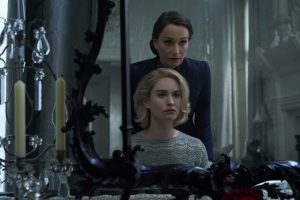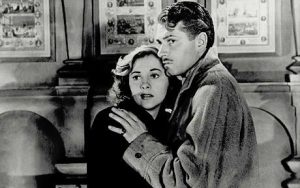I went into the 2020 adaptation of Daphne de Maurier’s classic crime thriller Rebecca prepared to at least try and like it. This was partly because I’ve watched Alfred Hitchcock’s famous adaptation, and…well, I have to admit I see why Hitchcock himself later attempted to distance himself from the film, feeling it wasn’t one of his best works. It’s actually quite good right up until the third act, where I feel it just becomes rather boring. So when I started hearing that this new Netflix adaptation makes some big changes to the ending of the story, I was curious and cautiously optimistic.

Little did I know that the ending to 2020’s Rebecca isn’t just the worst part of the film, but also manages to make a mockery out of Daphne de Maurier’s story. So, without getting into spoilers, my advice to all of you is that, if you are also mistakenly led to believe that this film has some exciting new twist at the ending, don’t fall for it. Back out now. Save yourself two hours of your time and escape from Rebecca while you still can – because I assure you that as much as the characters in the movie might be trying desperately to convince you that it’s all terribly exciting to be caught up in her web of intrigue and betrayal, it’s really not.
The biggest problem with this new version of the classic story, which follows a nameless female protagonist (played by Lily James, usually a pure delight no matter how bland the role) as she tries to outmaneuver the phantoms of her mysterious husband’s ex-wife’s phantom, is that it simply can’t pick a single, consistent tone. Clearly it thinks it’s every bit as intellectual and engaging as its source material, a suspenseful novelette written in 1938, but at the same time it really just wants to be a modern, pulpy, “don’t-think-too-hard-about-this” kind of retelling, and the clash between those two wildly different ideas (both of which would probably be perfectly valid, separately) leads to a discombobulated hybrid that never feels able to stay on track for very long. I personally think it would be absolutely fine to go a little pulpier, a little campier even, and just transfer the whole story into a modern day setting and go from there, as long as de Maurier’s message was preserved (another thing 2020’s Rebecca failed to do). At least it would be a choice. But I feel like someone behind the scenes must have decided that they couldn’t possibly do that because it would rob the film of any “credibility” or “respectability” – two things which the screenwriters have tried to forcibly inject into the film’s dull, unsubtle script…to no avail, because at every turn they undermine their own best efforts with a string of anachronistic and jarring casting choices, mannerisms, styling decisions, story beats, and even song choices (modern indie music, in case you were wondering), none of which seem to have been designed with Academy Awards voters in mind.

And because the film can’t figure out its target audience, everyone loses. Sometimes it looks like it’s trying to aim for a demographic who love sensual, sensational, addictive page-turners, and it’s at these points where it unfortunately feels like it should be most comfortable – I say “unfortunately” not because this demographic is inferior to any other (in fact, Rebecca, at the time of its publication, was widely considered as pulp fiction for the masses), but because Rebecca simply can’t give this demographic what they want without alienating everyone who loves the original story because of what it has to say about romance, relationships and gender roles – things that are, for the most part, utterly foreign to the romance genre. Rebecca (the novel, that is) isn’t a typical romance, and that’s the problem. De Maurier herself called it “a study in jealousy”. But when the screenwriters of 2020’s Rebecca were faced with the task of adapting it, they chose to adapt it as one would a typical romance…and so their creation, a ghastly chimaera if ever I saw one, dies on impact. None of the storytelling choices made in the novel even feel suitable for the kind of story that this creative team are telling.
A good example of this is the namelessness of our protagonist: as in past iterations of the story, our heroine goes through the entire story, start to finish, without a name, only going by the title “the second Mrs. de Winter”, as a cruel, cynical reference to how she is unable to carve out any semblance of identity when compared to her predecessor, the incomparable Rebecca – but this version rarely if ever feels engaging enough on a psychological level to warrant keeping this bold decision by de Maurier (who was drawing on her own unhappy relationship with her husband and his ex-wife for inspiration). Then again, it rarely feels engaging, period.
This isn’t just because the script is badly-written: unfortunately, a large part of the blame falls on Lily James and especially Armie Hammer as Maxim de Winter (a character intended to be very charismatic and mysterious), neither of whom can muster much passion, fear, excitement or…well, any emotion, really. Not once in two hours does Armie Hammer manage to look even remotely interested in the supposedly very compelling and personal story unraveling at high speed all around him: mostly all he does is stand around and widen his eyes periodically to demonstrate anger or overwhelming emotion. Also, he sleepwalks…once, for some reason, because that’s a thing that apparently needed to happen.
That strange scene is only one in a series of back-to-back instances in which Lily James is repeatedly hammered (no pun intended) over the head with increasingly loud and unsubtle references to Rebecca. When she’s not being berated and physically attacked by Maxim’s elderly mother, who starts clawing at her after finding out that her dear daughter in law Rebecca is dead, she’s instead being passed handkerchiefs, hair brushes and various small household articles all monogrammed with Rebecca’s enormous initial. Nothing wrong with that, of course, but when it occurs in every scene for most of the second act, it’s hard to become hooked on the element of suspense. Jane Goldman’s script isn’t designed to cleverly lure you along on any sort of harrowing journey: it’s just a series of one character after another doing everything but breaking down the fourth wall to remind us about Rebecca. Hitchock’s script, in comparison, takes its time, spreading out these more obvious scenes and punctuating them with quieter, subtler moments that feel significant without needing to literally spell out why they’re significant. There’s even a (very random) scene with an entire swarm of birds that come dangerously close to forming the shape of a giant R in the sky.

The film’s greatest crime is what it does to Mrs. Danvers (Kristen Scott Thomas), an iconic character in literary and cinematic history. Thomas would probably be a good Mrs. Danvers in another writer and director’s hands, but her story – particularly its conclusion – are bungled this time around; a sad downgrade from Judith Anderson’s spellbinding performance in Hitchcock’s film. One gets the sense that Thomas wanted desperately to go full camp and lean far more heavily on the novel and original film’s famous queer subtext (the delicate finger caress that she and James exchange when Thomas hands her a fallen glove is the most sexually charged scene in a movie that mistakenly assumes Armie Hammer is its most attractive cast member), but was prevented from doing so by a script that seems suspiciously hell-bent on trying to strip away said subtext…and of course, insists on making Thomas act all dour and serious. When a movie made in 2020 and apparently trying to be progressive feels more uptight and conservative than a film made in 1940 under the surveillance of the Hayes Code, you’re doing something wrong. Maxim himself, also suggested by some book readers to be queer-coded and played by Laurence Olivier in the Hitchcock film, is straight through and through: not a big deal, but another instance where the writers could have done something interesting and chose not to.
Several other side characters receive the same treatment, and nobody apart from Thomas makes any lasting impression: not even Ann Dowd, who makes the least of what should have been her glorified cameo in the film – no thanks to the script, which has taken the funny, flirtatious character of Edythe Van Hopper and turned her into a grotesque, leering abuser who seems personally invested in trying to make her lady’s companion miserable: whether that’s by gaslighting her while the girl cries, locked inside her bedroom, or by amusing her equally wicked friends with stories of her awkward antics.

Is there anything that redeems this Rebecca? I suppose the locations are very beautiful (though Manderley isn’t quite as lavish as one would want), and the costumes are all appropriately fashionable by modern standards. I have a bit of a hard time believing that our protagonist, who is meant to be shy and reserved, would be running around in big, baggy trousers in the late 1930’s, at a time when such a thing would still be considered eyebrow-raising if no longer totally scandalous, but it is what it is. It’s just more proof that director Ben Wheatley and Jane Goldman should not have been making a period piece, when it’s clear that wasn’t what they wanted to do.
Despite all this, I still hope that someone will someday make a better retelling of Rebecca, one that perhaps actually attempts to achieve something worthwhile and gay, and which maybe manages to finally capture throughout the haunting beauty promised by the novel’s famous opening, in which our heroine, ever the restless dreamer, revisits the ruined Manderley in her sleep…because this version’s attempts at tonal consistency are likely to haunt my nightmares.
Rating: 2/10
